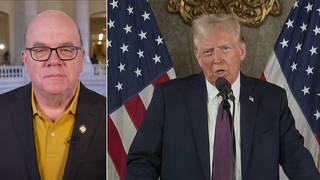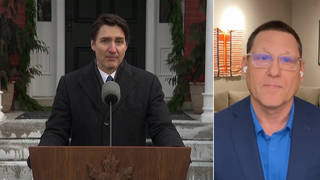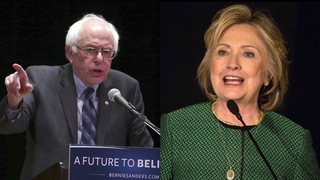
Related
Guests
- Jessica Stitesexecutive editor of In These Times.
- Rick PerlsteinChicago-based reporter and author of several books, including Nixonland: The Rise of a President and the Fracturing of America.
The relationship between the Bernie Sanders campaign and the Democratic Party leadership has been challenging from the start of the 2016 election campaign, when former Secretary of State Hillary Clinton began the primaries with a more than 400-delegate lead by securing support from superdelegates—the 712 congressmembers, senators, governors and other elected officials who often represent the Democratic Party elite. Now a new article from In These Times by Branko Marcetic uncovers “The Secret History of Superdelegates,” which were established by the Hunt Commission in 1982. We are joined by Jessica Stites, executive editor of In These Times and editor of the site’s June cover story, and Rick Perlstein, the Chicago-based reporter and author of several books, including “Nixonland: The Rise of a President and the Fracturing of America.”
Transcript
AMY GOODMAN: This is Democracy Now!, democracynow.org, The War and Peace Report. I’m Amy Goodman. And we are on the road in Chicago, broadcasting from WYCC PBS Chicago. It has been an—it has been an eventful few days for the Democratic Party, from the contested Nevada state Democratic convention Saturday to the split results Tuesday night in primaries Kentucky—in both Kentucky and Oregon. Former Secretary of State Hillary Clinton declared victory against Democratic presidential candidate Bernie Sanders in the primary on Tuesday in Kentucky, though it is razor-thin margin, while Sanders won a decisive victory in Oregon. Last night, Sanders spoke to about 12,000 supporters in Carson, California, directly addressing the Democratic Party leadership.
SEN. BERNIE SANDERS: In almost every case, whether it is a national poll or a state poll, we do much better against Trump than does Secretary Clinton. Just—poll just came out, I think it was yesterday, the state of Georgia, not a very good state for us: Trump was beating Secretary Clinton by four points; we were beating him by five points.
AUDIENCE: Bernie! Bernie! Bernie! Bernie! Bernie! Bernie! Bernie! Bernie!
SEN. BERNIE SANDERS: If the Democratic—if the Democratic Party wants to be certain that Donald Trump is defeated—and that, we must do—we, together, are the campaign to do that.
AMY GOODMAN: The relationship between the Sanders campaign and the Democratic Party leadership has been challenging from the start of the primary race, when former Secretary of State Hillary Clinton began with a more than 400-delegate lead by securing support from superdelegates—the 712 congressmen, senators, governors and other elected officials who often represent the Democratic Party elite.
Well, a new article from In These Times by Branko Marcetic uncovers “The Secret History of Superdelegates,” which were established by the Hunt Commission in 1982. Jessica Stites is executive editor of In These Times and editor of the site’s June cover story. Still with us, Rick Perlstein, Chicago-based reporter and author of several books, including Nixonland: The Rise of a President and the Fracturing of America.
Let’s start with you, Jessica. Explain the superdelegates, which has really become such a critical issue right now, how they came into being.
JESSICA STITES: Sure, yeah. Our reporter, Branko Marcetic, actually went down to the National Archives and dug up the transcripts of this entire commission, that debated for months about Democratic Party rules reforms and came up with the superdelegates as their answer. And basically, what had prompted this were the losses of Carter and McGovern, and so this fear that the Democratic Party wasn’t nominating sort of electable, winnable candidates. And so, these sort of party insiders sat down and said, “What do we do?” And their instinct was, “Well, we need to take control. We need to take control of the nominating process. We’re worried that sort of if we let the people decide through primaries, they’re going to pick the wrong person.” And so they instituted the superdelegate, who could act as a corrective, essentially, to the popular vote by, at the convention, casting votes for whomever they chose. And what really the sort of psychology you saw there—and this comes up a lot in the transcripts—is this fear of the activist or the outsider candidate that might disrupt the party, might not work with the Democrats the way they want once that person comes to the presidency, and so in this sort of sense that the elites kind of know best, and “we have a particular political acumen.”
AMY GOODMAN: And again, this was in response to?
JESSICA STITES: Well, McGovern and Carter. So, interestingly, they didn’t see Carter as an insider, in a nutty way. They saw him as this sort of Southern outsider who was mostly drawing officials from his own local circles, and he wasn’t working with them in the ways they wanted to—him to, when he was in office. So they were afraid of someone like that. And then they were afraid of a leftist activist, a grassroots activist. So those were their two fears. And they—also they were reacting, in large part, to the spread of the primary system, which had really become much more central after some 1968 reforms that were put into place.
AMY GOODMAN: I want to turn to a quote from Geraldine Ferraro, member of Congress from New York, first female vice-presidential candidate, who was a member of the Hunt Commission. She said during a meeting of the commission in November 1981, quote, “No one knows those people better than a Member of Congress. No one is better able to represent them at the convention than a Member of Congress, and no one is better able to get them to support a candidate, if they really try.” Explain, Jessica.
JESSICA STITES: Yes. So, that was the sort of tortured logic you kept seeing at the commission, where they said kind of the people who vote in primaries can’t represent the grassroots as well as congressmembers can, because congressmembers were originally elected. So, sort of this layer of representation is somehow going to help represent the grassroots, instead of letting people just vote for themselves. And it’s very odd and—
AMY GOODMAN: Interestingly, I mean, congressmembers aren’t elected by superdelegates.
JESSICA STITES: An excellent point. And at the time, to be fair, primary turnout was fairly low, and it’s still lower than a presidential election today, so that was their logic, as well: “We maybe got more votes than the primary.”
AMY GOODMAN: Let me turn to a quote from Cleta Deatherage, one of the members of the Hunt Commission, as well. She expressed concern about the division that a system of superdelegates might create, saying, quote, “you raise the question of creating different castes of delegates potentially, delegates which are chosen essentially by voters’ decisions for candidates in primaries or caucuses, and a different caste of delegates who in fact are exempt from that process and in fact carry on their own by a different set of standards … It gets you into a question of how those processes relate, and it gets to an essential question of legitimacy.”
JESSICA STITES: Yeah, she was really prescient, because that is exactly the criticism of superdelegates today. And it’s—they’re very unpopular, and there really is a movement rising up to say, “Why should the Democratic Party have this sort of final deciding vote instead of listening to the will of the people?”
AMY GOODMAN: So, talk about superdelegates in relation now to Bernie Sanders and Hillary Clinton.
JESSICA STITES: Sure. Well, what’s so interesting—and we’re seeing this especially after the results this morning—is that neither of them are on track to a decisive victory based only on primaries and caucuses. So, they would need to get 2,383 pledged delegates coming out of that process in order to just be the nominee. And that means superdelegates will matter at the convention. They will be the ones who ultimately tip someone over the edge.
And what we’re seeing from Sanders is this kind of fascinating pivot. So he was initially very much against superdelegates, because they had given Hillary Clinton this incredible momentum starting out in the race, which I think is the main criticism of superdelegates, is they give someone a sort of unfair advantage by making it look like they’re already ahead before the race begins. But now Sanders is saying, “Well, you’ve got this class of people who are supposed to be making sure the Democratic Party has a winning candidate. That’s their reason for being.” And that was very much what we saw in the transcripts, was, you know, if something should happen midstream and the candidate that is the front-runner in the primaries and caucuses looks like they can’t win—you know, maybe they have a scandal—we want to be able to correct that. And so, Sanders is saying, “Well, something unexpected happened: Donald Trump is the nominee of the Republican Party. Democrats need to react to that, and I am polling better than Hillary Clinton against Donald Trump in some key states.” He was talking about, I think, Georgia in that clip, but he’s—that’s happening in Ohio, which is a really important, obviously, state. And so that’s his case to the superdelegates, is, “Well, if you have this weird system where you can trump the popular vote, isn’t this the time to use it?”
AMY GOODMAN: And the move to reform the superdelegate system? Do you see this all changing?
JESSICA STITES: You know, that—that’s a great question right now. So Sanders is no longer talking about that, because he’s trying to court the superdelegates. But I don’t think it’s off the table at all. We had an op-ed actually run along with our cover story, by Larry Cohen, who is the former president of the Communication Workers of America but also a senior adviser to the Sanders campaign. And he is calling very strongly for the—at the convention, for the Democrats to abolish or reform the superdelegate system. And I think there’s definitely a faction within the Sanders campaign that wants that.
AMY GOODMAN: Can you talk, Rick Perlstein, about how the Democrats and their process compares to the Republicans?
RICK PERLSTEIN: They’re similar. They—when the Democrats reformed their system, you know, between 1968 and 1972, it was kind of seen as this was the direction history was going: more democracy, you know, less smoke-filled rooms. So, a system in both parties that had been kind of mostly caucuses and conventions and some primaries became mostly primaries and then some caucuses and conventions.
AMY GOODMAN: What happened in Nevada? Can you, Jessica Stites, talk about what we just saw? I mean, there’s a police line in front of the stage?
JESSICA STITES: Yeah. I think that—
AMY GOODMAN: And, Rick, would you like to weigh in on that?
JESSICA STITES: Yeah.
RICK PERLSTEIN: Well, I mean, you know, we saw—we saw the footage. It was a very contested convention. The Clinton folks say the Sanders folks knew the rules in advance and then complained when the rules didn’t advantage them. The Sanders folks say that basically we have an establishment that’s trying to assert their powers. I think, when I look back historically, I see the attempts to exacerbate these divisions as possibly a strategy of Donald Trump and the Republicans. He has an ally named Roger Stone, who was part of Watergate. The whole strategy of Watergate all through 1972 was to create divisions that were based in real divisions, but to exacerbate them. So, like a Roger Stone-type figure would steal letterhead from one of the Democratic candidates, write a letter accusing another Democratic candidate of cheating, and then get that out to the media. Right? So, the idea is, if Democrats can’t get back together in the general election, then the Democrats can’t win. Now, these divisions are real, and the anger is real, but the exploitation of it is very similar to kind of what the FBI did in COINTELPRO. They take real divisions and try and turn them into divisions that make it impossible for people to work together. So we need to be careful about that.
AMY GOODMAN: Roger Stone is the source on so many of the National Enquirer stories against—
RICK PERLSTEIN: That’s right. That’s right. My next article is about how—
AMY GOODMAN: —against Ted Cruz.
RICK PERLSTEIN: Yeah, Donald Trump partakes of a reactionary tradition within gossip politics, something like the National Enquirer. I actually have a document in which Michael Deaver, Ronald Reagan’s longtime aide, tries to pitch Ronald Reagan as a columnist for the National Enquirer in 1975. So there’s a continuity there.
AMY GOODMAN: Back to Hunt Commission. Your final observations, Jessica Stites, as you dug into the documents and your reporter did? It was named after?
JESSICA STITES: Oh, Hunt, he was a former governor, I think, and he was chairing the—no, is that wrong, Rick? You’re making history faces.
RICK PERLSTEIN: No, I think so. No, no, I think it was a South Carolina maybe.
JESSICA STITES: I believe so. That sounds right.
RICK PERLSTEIN: But that was kind of it: He was a Southerner, right?
JESSICA STITES: Yes. He was chairing the commission. You know, I think superdelegates are not the only thing wrong with our electoral process. And one of the great things about kind of opening the door to questioning superdelegates, which are a pretty easy reform for the Democratic Party to make if they so choose, is, what else is wrong? Why are so few Americans voting in our general election?
AMY GOODMAN: I mean, we’re talking about less than 80 percent—no, more than 80 percent of people are not voting in the primaries and caucuses.
JESSICA STITES: Yeah, and that is a real problem. And there are things that can be done to address that. I mean, Rob Richie of FairVote has, I think, a great proposal, which is have one nationwide primary on one day—one person, one vote—and that will decide the Democratic candidate. So, there are things we can do, and it doesn’t—this is just a party process. This does not require changing the Constitution.
AMY GOODMAN: Well, I want to thank you both for being with us, Jessica Stites of In These Times, which is based here in Chicago, and Rick Perlstein, a Chicago-based reporter who reports for The Washington Spectator. And we’re going to link to all your reports at democracynow.org.
This is Democracy Now!, democracynow.org, The War and Peace Report. When we come back, we’re going to look at what’s been happening with police here in Chicago and the mayor, Rahm Emanuel. Stay with us.












Media Options